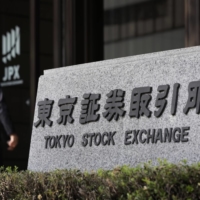In the face of growing global competition among stock exchanges — and a rising sense of need to change its corporate culture — Japan is reforming its stock markets to attract more long-term investors.
Next April, the Japan Exchange Group will reorganize the market structure of the Tokyo Stock Exchange from its current four markets — First Section, Second Section, Mothers and JASDAQ — to three markets named Prime, Standard and Growth.
The reforms intend to increase the attractiveness of the flagship Prime market by setting more stringent minimum financial requirements on profits, net asset size and tradable market capitalization. The change is in response to investors’ long-standing criticisms that the First Section included several less liquid, small-cap stocks as well as companies that are not taking corporate governance seriously.
Two further notable changes will be applied to all listed companies, which could contribute to improving Japan’s corporate governance.
First, cross-shareholding will no longer be considered as tradable stocks. Cross-shareholding refers to strategically held stocks among suppliers and client companies — it is one of corporate Japan’s practices that has long been criticized by foreign investors for several reasons. For a long time, cross-shareholding was viewed as a practice that prevented takeovers from foreign companies, disregarded minority shareholders and made corporate boards conservative — leading to lower profitability compared to American and European companies.
With the new designations, the more stringent definition of tradable stocks will likely discourage such notorious corporate practices, along with hopes of businesses enhancing their efforts to raise long-term corporate value.
Second, the reforms will end favorable treatment given to the initial and continued listing requirements by consolidating them.
Over the years, the number of listed companies in the TSE’s First Section grew steadily — partly because of the lower bar set to stay in the prestigious club. But once businesses successfully settled in the First Section, some companies became less motivated to improve their financial performance. The new, tighter requirements for continued listing, therefore, are expected to enhance the value of the Prime market by prompting and requiring businesses to make efforts to stay in the top tier.
With these changes, there will be fewer companies in the Prime market than the current First Section. This will have major implications on the Tokyo Stock Market Price Index (TOPIX) — which currently covers all companies listed in the First Section.
While the exact schedule is yet to be determined, the TOPIX will eventually only include listed companies in the Prime market. Professional investors prefer the market capitalization-based TOPIX over the simple price-based Nikkei 225 as a representative indicator of Japan’s stock market.
That’s why including the smaller, but more qualified number of stocks in the TOPIX will be welcomed by many investors. This may enhance the status of the TOPIX and the reputation of the TSE globally.
The most novel element of the reforms is that the Prime market will be subject to tougher ESG (environmental, social and corporate governance) standards set by the recently revised Japanese Corporate Governance Code. The code was compiled by the Financial Services Agency and the Tokyo Stock Exchange, and applies to listed companies on the comply or explain approach.
In an effort to bring corporate governance closer to global standards, most stringent requirements will be applied to the Prime market, including increasing the number of independent nonexecutive board members to more than a third; increasing disclosure in English; and, disclosing climate change related disclosure in line with the Task Force on Climate-Related Financial Disclosures recommendations.
The question is whether such reforms will truly transform Japanese companies’ profitability and ESG performance.
Currently, around 500 companies or so are reportedly expected to be dropped out from the first tier section and to be downgraded to either Standard or Growth market. Those companies may try to cling to the Prime market, since many of Japan’s companies are preoccupied with the belief that being listed on the flagship market is a way to enhance a company’s reputation, credibility and to secure high-quality employees — rather than a way to diversify or expand financing sources.
To allow for a smooth transition, companies will be able to remain in the Prime market for an indefinite time as long as a reform plan is submitted. Yet to make reforms credible, a clear near-term deadline is necessary. As for the TOPIX, the index from April 2022 will continue to include all the companies already listed in the first tier and will exclude only those stocks failing to meet the minimum threshold of ¥10 billion on tradable market capitalization from January 2025 — leaving other requirements nonbinding.
Another concern is that some companies may attempt to fulfill the standards described in the Corporate Governance Code without fundamentally changing the corporate management practices and corporate culture, since the Code is practiced by companies voluntarily without mandatory requirements.
For example, companies may continue cross-shareholding relationships by reducing the number of stocks, but not entirely disposing them. Some companies may increase independent nonexecutive board members without tight criteria for independence. Companies may disclose climate-related information without disclosing greenhouse gas emission data and setting the emission targets. As the government is committed to cutting carbon emissions by 46% by 2030 and achieving net zero emission by 2050, such disclosures should be mandatory. It should also gradually expand its scope to cover more companies.
Whether the Tokyo Stock Exchange Market reforms together with the revised Corporate Governance Code will really make a difference in terms of promoting Japan’s corporate value needs to be monitored closely.
Sayuri Shirai is a professor at Keio University and a former Policy Board member of the Bank of Japan.
In a time of both misinformation and too much information, quality journalism is more crucial than ever.
By subscribing, you can help us get the story right.
SUBSCRIBE NOW



